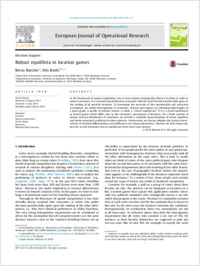Robust equilibria in location games
- Buechel, Berno University of Hamburg
- Roehl, Nils University of Paderborn and Bielefeld University
-
2015
Published in:
- European Journal of Operational Research. - 2015, vol. 240, no. 2, p. 505-517
English
In the framework of spatial competition, two or more players strategically choose a location in order to attract consumers. It is assumed standardly that consumers with the same favorite location fully agree on the ranking of all possible locations. To investigate the necessity of this questionable and restrictive assumption, we model heterogeneity in consumers’ distance perceptions by individual edge lengths of a given graph. A profile of location choices is called a “robust equilibrium” if it is a Nash equilibrium in several games which differ only by the consumers’ perceptions of distances. For a finite number of players and any distribution of consumers, we provide a complete characterization of robust equilibria and derive structural conditions for their existence. Furthermore, we discuss whether the classical observations of minimal differentiation and inefficiency are robust phenomena. Thereby, we find strong support for an old conjecture that in equilibrium firms form local clusters.
- Faculty
- Faculté des sciences économiques et sociales et du management
- Department
- Département d'économie politique
- Language
-
- English
- Classification
- Economics
- License
-
License undefined
- Identifiers
-
- RERO DOC 327340
- DOI 10.1016/j.ejor.2014.07.019
- Persistent URL
- https://folia.unifr.ch/unifr/documents/308211
Statistics
Document views: 135
File downloads:
- Document: 206
